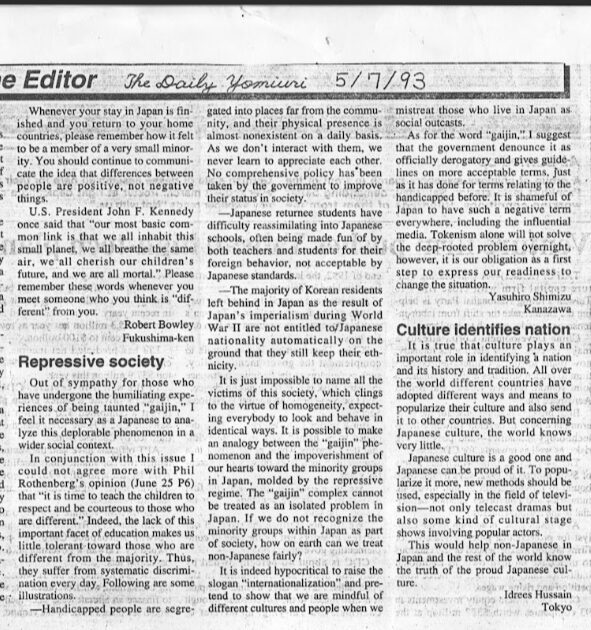「ガイジン」と呼ばれることの意味――日本社会における差別と多様性への提言|金沢市 英会話エスティーム

以下は、私が大学を卒業し社会人となるタイミングで、英字新聞「The Daily Yomiuri(現 The Japan News)」に投稿した手紙です。日本社会に根強く残る「ガイジン」という言葉や、少数派への扱いについて、自分自身の思いを綴りました。
この手紙を通して、言語としての英語力だけでなく、異文化理解や社会的課題への関心を持って英語を使ってきたことをお伝えできればと思います。
この手紙を通して、言語としての英語力だけでなく、異文化理解や社会的課題への関心を持って英語を使ってきたことをお伝えできればと思います。
英文本文
Repressive society
Out of sympathy for those who have undergone the humiliating experiences of being taunted as "gaijin," I feel it necessary as a Japanese to analyze this deplorable phenomenon in a broader social context.
In conjunction with this issue, I could not agree more with Phil Rothenberg's opinion (June 25 P6) that "it is time to teach the children to respect and be courteous to those who are different." Indeed, the lack of this important facet of education makes us less tolerant toward those who are different from the majority. Thus, they suffer from systematic discrimination in the nation every day. The following are some illustrations.
- Handicapped people are segregated into places far from the community, and their physical presence is almost nonexistent on a daily basis.. As we don't interact with them, we never learn to appreciate each other. No comprehensive policy has been taken by the government to improve their status in society."
Japanese returnee students have difficulty reassimilating into Japanese schools. They are often made fun of by both teachers and students for their foreign behavior, which is not acceptable by Japanese standards.
- The majority of Korean residents left behind in Japan as the result of Japan's imperialism during World War II are not entitled to Japanese nationality automatically on the grounds that they still retain their ethnicity.
It is just impossible to name all the victims of this society, which clings to the virtue of homogeneity, expecting everybody to look and behave in identical ways. It is possible to make an analogy between the "gaijin" phenomenon and the impoverishment of our hearts toward the minority groups in Japan, molded by the repressive regime. The "gaijin" complex cannot be treated as an isolated problem in Japan. If we do not recognize the minority groups within Japan as part of society, how on earth can we treat non-Japanese fairly?
It is indeed hypocritical to raise the slogan "internationalization" and pretend to show that we are mindful of different cultures and people when we mistreat those who live in Japan as social outcasts.
As for the word "gaijin," I suggest that the government denounce it as officially derogatory and give guidelines on more acceptable terms, just as it has done for terms relating to the handicapped before. It is shameful of Japan to have such a negative term everywhere, including the influential media. Tokenism alone will not solve the deep-rooted problem overnight. However, it is our obligation as a first step to express our readiness to change the situation.
Yasuhiro Shimizu
Kanazawa
Out of sympathy for those who have undergone the humiliating experiences of being taunted as "gaijin," I feel it necessary as a Japanese to analyze this deplorable phenomenon in a broader social context.
In conjunction with this issue, I could not agree more with Phil Rothenberg's opinion (June 25 P6) that "it is time to teach the children to respect and be courteous to those who are different." Indeed, the lack of this important facet of education makes us less tolerant toward those who are different from the majority. Thus, they suffer from systematic discrimination in the nation every day. The following are some illustrations.
- Handicapped people are segregated into places far from the community, and their physical presence is almost nonexistent on a daily basis.. As we don't interact with them, we never learn to appreciate each other. No comprehensive policy has been taken by the government to improve their status in society."
Japanese returnee students have difficulty reassimilating into Japanese schools. They are often made fun of by both teachers and students for their foreign behavior, which is not acceptable by Japanese standards.
- The majority of Korean residents left behind in Japan as the result of Japan's imperialism during World War II are not entitled to Japanese nationality automatically on the grounds that they still retain their ethnicity.
It is just impossible to name all the victims of this society, which clings to the virtue of homogeneity, expecting everybody to look and behave in identical ways. It is possible to make an analogy between the "gaijin" phenomenon and the impoverishment of our hearts toward the minority groups in Japan, molded by the repressive regime. The "gaijin" complex cannot be treated as an isolated problem in Japan. If we do not recognize the minority groups within Japan as part of society, how on earth can we treat non-Japanese fairly?
It is indeed hypocritical to raise the slogan "internationalization" and pretend to show that we are mindful of different cultures and people when we mistreat those who live in Japan as social outcasts.
As for the word "gaijin," I suggest that the government denounce it as officially derogatory and give guidelines on more acceptable terms, just as it has done for terms relating to the handicapped before. It is shameful of Japan to have such a negative term everywhere, including the influential media. Tokenism alone will not solve the deep-rooted problem overnight. However, it is our obligation as a first step to express our readiness to change the situation.
Yasuhiro Shimizu
Kanazawa
翻訳文
抑圧的な社会
「ガイジン」とからかわれるという屈辱的な経験をした人々に対する同情の念から、私は日本人として、この嘆かわしい現象をより広い社会的文脈で分析する必要があると感じています。
この問題に関連して、フィル・ローゼンバーグ氏(6月25日付け6面)の「違いのある人々を尊重し、礼儀正しく接することを子どもたちに教える時が来た」という意見に、私は全面的に賛同します。実際、このような教育の重要な側面が欠けているために、多数派と異なる人々に対して私たちは寛容さを欠き、結果として彼らは日常的に体系的な差別に苦しめられています。以下にいくつかの例を挙げます。
障がいを持つ人々は、地域社会から離れた場所に隔離されており、私たちの日常生活の中で彼らの姿を見ることはほとんどありません。交流がないため、お互いを理解し、尊重し合う機会も失われています。政府は、彼らの社会的地位を改善するための包括的な政策をこれまでに取ってきていません。
帰国子女は、日本の学校に再適応するのに困難を感じています。外国的な振る舞いが日本の基準にそぐわないとして、教師や生徒の双方からからかわれることが多いのです。
第二次世界大戦中の日本の帝国主義の結果として日本に残された多くの在日韓国人は、その民族的ルーツを保持していることを理由に、自動的に日本国籍を取得する権利を与えられていません。
このように、同じように振る舞い、同じように見えることを求める「同質性の美徳」に固執する日本社会においては、その被害者をすべて挙げることなど到底できません。「ガイジン」という現象は、日本の抑圧的な体制によって形作られた、少数派に対する私たちの心の貧しさと類似していると言えるでしょう。「ガイジン」コンプレックスは、決して日本における孤立した問題ではありません。日本国内の少数派を社会の一部として認めることができなければ、どうして外国人を公正に扱うことができるのでしょうか。
「国際化」というスローガンを掲げ、異なる文化や人々に対して配慮しているふりをする一方で、国内に住む人々を社会の周縁に追いやっているのは、まさに偽善です。
「ガイジン」という言葉については、政府が公式に侮蔑語であると認め、障がいに関する言葉のように、より適切な表現に関するガイドラインを示すべきだと思います。このような否定的な言葉が、影響力のあるメディアを含むあらゆる場所で使われているのは、日本にとって恥ずべきことです。見せかけだけの対応(トークニズム)では、この根深い問題は一朝一夕に解決しません。しかし、まずは現状を変えようという意思を示すことが、私たちの責務であると考えます。
「ガイジン」とからかわれるという屈辱的な経験をした人々に対する同情の念から、私は日本人として、この嘆かわしい現象をより広い社会的文脈で分析する必要があると感じています。
この問題に関連して、フィル・ローゼンバーグ氏(6月25日付け6面)の「違いのある人々を尊重し、礼儀正しく接することを子どもたちに教える時が来た」という意見に、私は全面的に賛同します。実際、このような教育の重要な側面が欠けているために、多数派と異なる人々に対して私たちは寛容さを欠き、結果として彼らは日常的に体系的な差別に苦しめられています。以下にいくつかの例を挙げます。
障がいを持つ人々は、地域社会から離れた場所に隔離されており、私たちの日常生活の中で彼らの姿を見ることはほとんどありません。交流がないため、お互いを理解し、尊重し合う機会も失われています。政府は、彼らの社会的地位を改善するための包括的な政策をこれまでに取ってきていません。
帰国子女は、日本の学校に再適応するのに困難を感じています。外国的な振る舞いが日本の基準にそぐわないとして、教師や生徒の双方からからかわれることが多いのです。
第二次世界大戦中の日本の帝国主義の結果として日本に残された多くの在日韓国人は、その民族的ルーツを保持していることを理由に、自動的に日本国籍を取得する権利を与えられていません。
このように、同じように振る舞い、同じように見えることを求める「同質性の美徳」に固執する日本社会においては、その被害者をすべて挙げることなど到底できません。「ガイジン」という現象は、日本の抑圧的な体制によって形作られた、少数派に対する私たちの心の貧しさと類似していると言えるでしょう。「ガイジン」コンプレックスは、決して日本における孤立した問題ではありません。日本国内の少数派を社会の一部として認めることができなければ、どうして外国人を公正に扱うことができるのでしょうか。
「国際化」というスローガンを掲げ、異なる文化や人々に対して配慮しているふりをする一方で、国内に住む人々を社会の周縁に追いやっているのは、まさに偽善です。
「ガイジン」という言葉については、政府が公式に侮蔑語であると認め、障がいに関する言葉のように、より適切な表現に関するガイドラインを示すべきだと思います。このような否定的な言葉が、影響力のあるメディアを含むあらゆる場所で使われているのは、日本にとって恥ずべきことです。見せかけだけの対応(トークニズム)では、この根深い問題は一朝一夕に解決しません。しかし、まずは現状を変えようという意思を示すことが、私たちの責務であると考えます。
まとめ
私がこの手紙を書いたのは、英語という言語を通して「日本社会の中にある課題」に向き合いたいという強い思いからでした。英語は単なるコミュニケーションツールではなく、自分の考えや信念を国境を越えて伝える力を与えてくれます。
英会話エスティームでは、英語を学ぶことを通して「自分の考えをしっかり伝えられる力」を育むことを大切にしています。英語を使って世界とつながりたい方、思いを英語で発信できるようになりたい方は、ぜひ一度、無料体験レッスンにお越しください。
当校受講生の体験記→
無料体験を申し込む
ホームに戻る
英会話エスティームでは、英語を学ぶことを通して「自分の考えをしっかり伝えられる力」を育むことを大切にしています。英語を使って世界とつながりたい方、思いを英語で発信できるようになりたい方は、ぜひ一度、無料体験レッスンにお越しください。
当校受講生の体験記→
無料体験を申し込む
ホームに戻る
